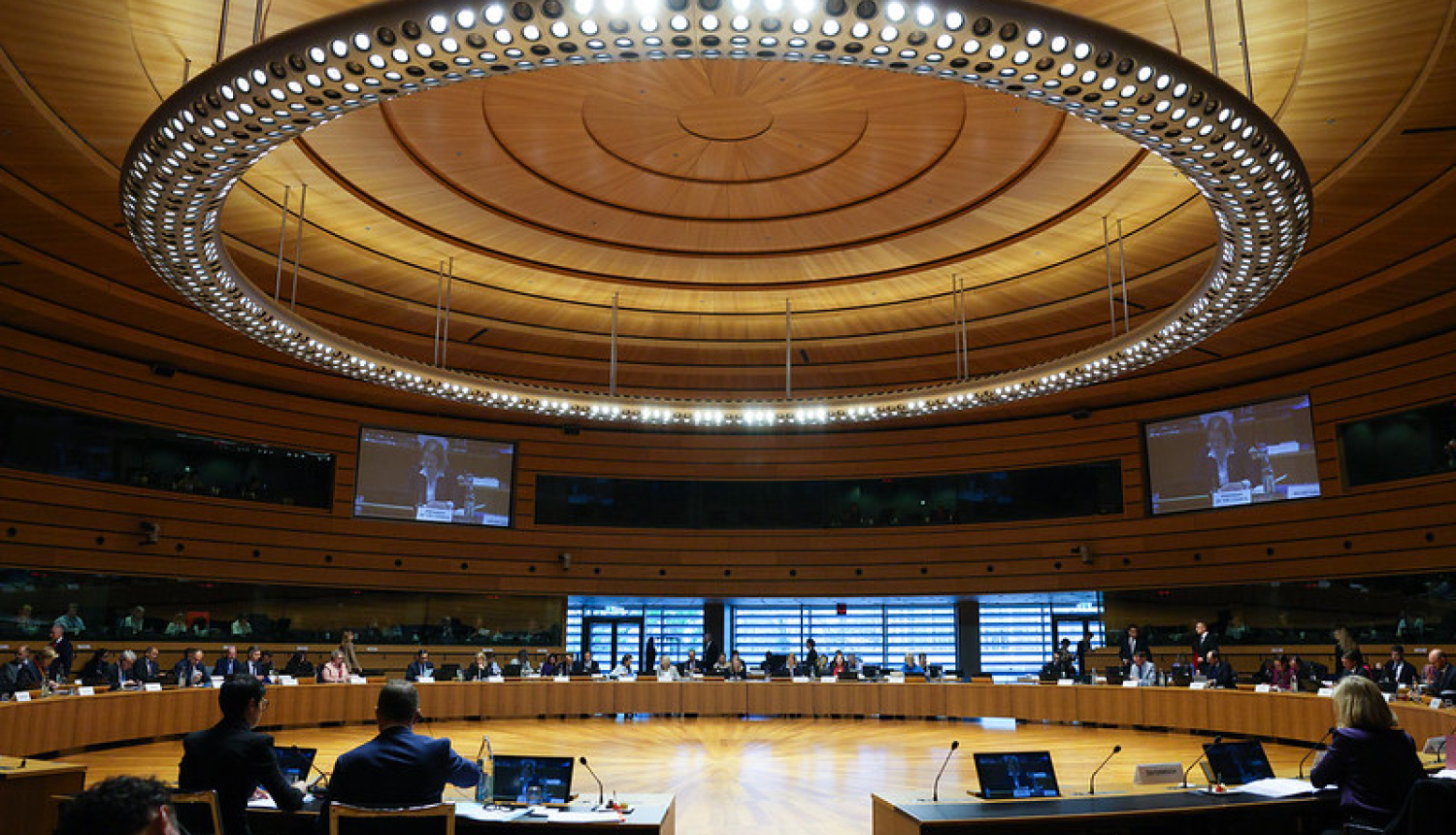On 14 April 2025 in Luxembourg, the Minister of Foreign Affairs, Baiba Braže, participated in a meeting of the European Union (EU) Foreign Affairs Council, which addressed further military support to Ukraine, the sectors of Russian economy to be covered by the 17th package of sanctions, the fight against Russia’s unconventional threats, and ensuring Russia’s accountability.
“Russia’s barbaric attack on Ukrainian civilians in the city of Sumy clearly shows that the aggressor’s ambitions have not changed. Our support for Ukraine must be unwavering. Not only political will and funding are important, but also Europe’s own industrial capacity to provide the much-needed military support. It is no less vital to align EU defence industry programmes with the objectives and capabilities set out in NATO’s defence plans,” Foreign Minister Baiba Braže noted.
The Minister of Foreign Affairs of Ukraine, Andrii Sybiha, joined the Foreign Affairs Council meeting via videoconference, and he underlined that Ukraine appreciates any military support provided by EU Member States. At present, there is an urgent need for air defence systems. The Ukrainian Foreign Minister also expressed hope that the initiative of the EU High Representative on the supply of ammunition to Ukraine will be implemented in the shortest possible timeframe.
In a Council’s discussion on future military support to Ukraine in 2025, ministers exchanged views on further development and enhancement of EU missions to Ukraine in line with Ukraine’s needs. Foreign Minister Baiba Braže welcomed the EU High Representative’s efforts in support of Ukraine and commended the work of the European Commission in implementing the ReArm Europe plan, which also provides for the possibility of financing military support to Ukraine and boosting the capacity of Europe’s own military industry. Baiba Braže called for a close engagement with all like-minded partners and organizations.
Ministers agreed that economic pressure on Russia should be increased to prevent Russia from rebuilding its capabilities. Baiba Braže pointed out: “Sanctions are working, the Russian war economy is crumbling. No easement or lifting of sanctions against Russia and Belarus is acceptable. The 17th package of sanctions should focus on further restrictions to the export of energy and raw materials, on sanctioning the transport and logistics sectors, and on preventing import of technologies. Legal solutions should be sought for the channelling of all immobilised assets of the Central Bank of Russia in support of Ukraine. It is also necessary to find a common EU solution for unblocking EUR 6.6 billion from the European Peace Facility.” Ministers also underlined the need to prepare a new round of sanctions targeting Russia’s unconventional threat.
“Ukraine’s future lies with the European Union. As concerns security guarantees for Ukraine, their essential element is the process of European integration, the implementation of which must continue. It is essential that an agreement be reached within the EU on the launch of Part 1 (Fundamental Rights) of Ukraine’s accession negotiations,” Baiba Braže emphasised.
EU foreign ministers also exchanged views on how to ensure Russia's accountability for the crime of aggression and took stock of the progress made in setting up the Special Tribunal. The EU High Representative proposed that its launch be announced on 9 May.
Ministers then discussed the situation in the Middle East, including Syria. Baiba Braže underlined: “We must work closely with regional and global partners, especially the United States and the Arab countries, to put an end to the crisis as soon as possible. A peaceful transition of power must be ensured in Syria.” The Council also approved a decision to add seven individuals and two legal entities to the list of Iran’s human rights sanctions regime for their involvement in the illegal detention of EU citizens in Iran.
EU Foreign Ministers also discussed the priorities of the EU-Africa strategic partnership in preparation for the EU-African Union Ministerial Meeting in Brussels on 21 May 2025. Baiba Braže stressed that “it is important to put in place strategic communication measures so as to explain the EU’s engagement and contribution to economic stability and development in Africa. The visibility and presence of the EU is particularly important given the growing involvement of Russia and disinformation campaigns on the African continent.” Foreign ministers also examined the situation in Sudan, which is undergoing the largest humanitarian crisis in the world.
The Foreign Affairs Council was preceded by an informal exchange between EU Foreign Ministers and the Foreign Ministers of the Western Balkan countries. Baiba Braže shared with them the Baltic states’ perspective on cooperation with the Western Balkan countries in the field of security and defence. The Minister welcomed the opening of the next chapter of Albania’s EU accession negotiations and emphasised: “The security and stability of the Western Balkan countries is an integral element of the security of Europe as a whole. We expect potential EU Member States to give unequivocal support for the EU values, in particular, through aligning their foreign policy with the EU’s Common Foreign Security Policy, which includes setting sanctions against Russia and Belarus. The ongoing process of EU integration must continue, and the EU must provide support to the region’s countries in promoting their resilience, including to fight disinformation and cyber-attacks.” Baiba Braže added that the participation of any EU Member State or candidate country in Russia’s 9 May parade was unacceptable and incompatible with European values.
The Baltic states informed the EU Foreign Ministers about the visit of the fifth President of Georgia, Salome Zurabishvili, to the Baltic capitals on 25-28 March.
For information
The Foreign Affairs Council deals with matters relating to EU external action, including the common foreign and security policy, the European security and defence policy, external trade and development cooperation. The Council’s main role is to ensure the unity, consistency and effectiveness of the EU’s external action.





